无论是文化还是国家发展层面来讲,新加坡这个国家即便有70%以上的华人,但是其国内的文化发展等各个方面和我们并不“沾边”。无论从国际外交还是从单一的角度来讲,谁也难以看出新加坡和我国有任何亲密的联系,甚至还对我国存在一定的“火药味”,而马来西亚华人群体在我国的声誉则要好得多。在美版知乎Quora上,外国网友提问道:为什么马来西亚华人总体看起来如此亲近中国,而新加坡华人却表现冷漠?这个问题引起各国网友的围观和热议,我们看看他们的观点。
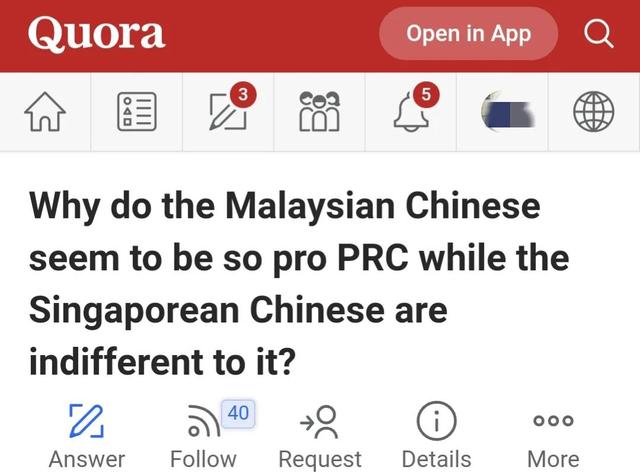
问题:为何马来西亚华人总体较亲近中国,而新加坡则表现冷漠?

新加坡网友利姆的回答
As a Singaporean Chinese, I have never been asked to return to China by my Malaysian compatriots in Singapore, nor have I been called “Chinese” or “panda Chinese”. In addition, no one in Singapore has any racial welfare, and everyone works according to order of the elite. Therefore, I have a country that I am proud of. I only regard China as a country where my ancestors originated. That’s all.
作为一名新加坡华人,我从来没有被我的新加坡马来同胞要求返回中国,也从来没有被称为“中国人”或“panda唐人”。此外,新加坡的任何人都并没有任何种族福利,所有人都按照精英阶层的秩序工作。因此,我有一个我引以为豪的国家,我只把中国视为一个我的祖先起源的国家,仅此而已。
On the other hand, for Malaysian Chinese, the situation is just the opposite. They have always been the target of right-wing Malaysian Political Parties and their radical supporters. Like the Indonesian Chinese, they are regarded as the country’s cash cow and scapegoat. Although they have made great contributions to Malaysia, they are constantly insulted by slang terms such as “Kafir”, “babi” and “pandatan”. Because of the Malays’ policy based on race, they did not get the same social status as Malays. Is that why they call us “Asian Jews”?
另一方面,对于马来西亚华人来说,情况恰恰相反,他们一直是右翼马来政党及其激进支持者的目标。就像印尼华人一样,他们被视为国家的摇钱树和替罪羊,尽管他们对马来西亚做出了重大贡献,但却不断受到“卡菲尔”、“巴比”和“潘达坦”等俚语的侮辱。由于马来人基于种族的政策,他们没能获得马来人同等的社会地位,这就是为什么他们叫我们“亚洲犹太人”的原因吧?
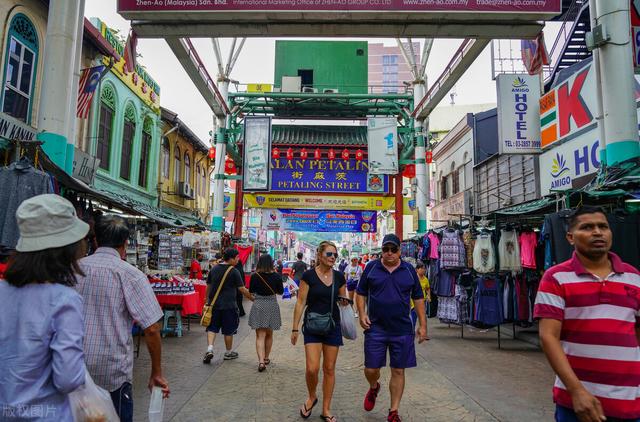
You may think that this is an ancient phenomenon, but in fact, it is still very active. Like the recent Malaysian dignity conference, some old friends claim that Malaysia has a history of 5000 years, and Malaysia only serves Malays. In fact, the condition for Malaysia’s independence from Britain is that it becomes a multi-ethnic country, and all Malays, Chinese and Indians are Malaysians.
你可能会认为这是一种古老的现象,但事实上,它仍然非常活跃,就像最近的马来尊严大会一样,一些老家伙声称马来西亚有5000年的历史,马来西亚只为马来人服务。事实上,马来西亚脱离英国独立的条件是它成为一个多种族国家,所有马来人、华人和印度人都是马来西亚人。
My question is, when people do not regard you as a compatriot and ask you to return to the place where your ancestors were born, will you still have the slightest attachment and loyalty to that country?
我的问题是,当人们不把你视为同胞,要求你回到你祖先出生的地方时,你还会对那个国家有丝毫的依恋和忠诚吗?
Of course, I am not saying that all Malaysian Chinese have lost their loyalty and love for Malaysia, because some of the most anti Singapore people I have met are not Malaysian Malays, but Malaysian Chinese.
当然,我并不是说所有的马来西亚华人都对马来西亚失去了忠诚和爱,因为我见过的一些最反新加坡的不是马来西亚马来人,而是马来西亚华人。
What I want to say is that the more the Malaysian government tries to split Malaysia according to race and religion, the only thing it can experience is that the loyalty of ethnic minorities to Malaysia is gradually decreasing, and at the same time, their kinship with China, India or any place where their ancestors came from is constantly increasing.
我想说的是,马来西亚政府越是试图按照种族和宗教分裂马来西亚,唯一能体验到的就是少数民族对马来西亚的忠诚度逐渐下降,与此同时,他们对中国、印度或他们祖先来自的任何地方的亲情不断增加。
Let me briefly talk about what happened to a Malaysian friend of mine. Let’s call him Meng.
下面我简短讲一下我的一名马来西亚朋友的遭遇,我们叫他孟吧。
Meng is from a small town in Kida. His way to school is very difficult. In high school, although he passed the national school admission examination, people like him had limited choices because public institutions of higher learning maintained strict quotas for non Malay students. Because demand exceeds supply, only overseas private colleges or schools can choose.
孟来自基达的一个小镇。他的求学路很艰难。高中时,他虽然通过了全国学校录取考试,但像他这样的人的选择是有限的,因为公立高等学校对非马来学生保持严格的配额。由于需求大于供给,只有海外的私立学院或学校可以选择。
Unfortunately, the weak currency ringgit and low wages make the west, including Australia, extremely expensive for ordinary Malaysians. This is why the number of Chinese Malaysians trained in Taiwan, the Hong Kong Special Administrative Region and the mainland in recent years has kept increasing. Mastering Chinese opens up educational and economic prospects for them.
不幸的是,疲软的货币林吉特和低工资使得包括澳大利亚在内的西方对普通马来西亚人来说极其昂贵。这就是为什么台湾地区、香港特区以及近年来在大陆培训的中国马来西亚人源源不断。掌握汉语为他们打开了教育和经济前景。
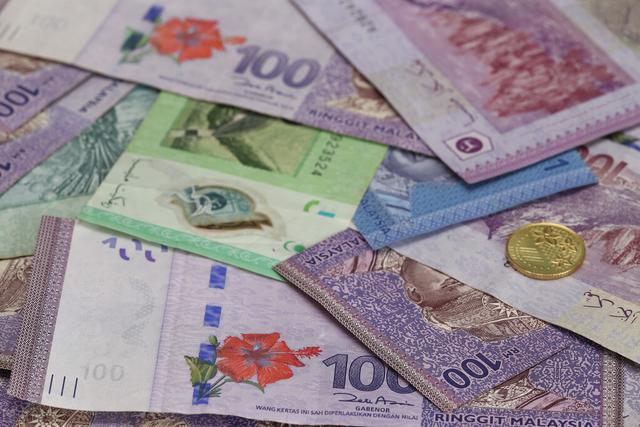
马来西亚货币林吉特
In fact, Chinese tend to gather together to cushion the impact of discrimination. The proportion of Chinese in Penang and Kuala Lumpur is very high. For Chinese, Malay brings much less opportunities than Chinese.
实际上,中国人倾向于聚集在一起,以缓冲歧视的影响。槟城、吉隆坡的华人比例很高,对中国人来说,马来语带来的机会比汉语少得多。
Just like in Singapore, English has opened the door to education and most jobs. The only restrictions are on housing, education and welfare for foreigners. Compared with their cousins in the northern mainland, they are much less useful in mastering Chinese.
就像在新加坡,英语为教育和大多数工作敞开了大门。唯一的限制是对外国人住房、教育和福利的限制。与北方大陆的表亲相比,他们掌握汉语的用处要小得多。
“For poor and disadvantaged Chinese like me, it is entirely reasonable to regard China as the motherland, because we are reminded every day that Malaysia serves the Malays, not the Chinese.”
“对于像我这样贫穷和处境不利的中国人来说,将中国视为祖国是完全有道理的,因为我们每天都被提醒,马来西亚是为马来人服务的,而不是华人。”

马来西亚华人约翰•秦的回答
Why is there a view that Malaysian Chinese are pro China? It is because we realize that when some people criticize the whole country, the whole political system or the whole race on a large scale, we have reason to believe that this is unfair and groundless, and we will not tolerate it. When it comes to China related reports, we can clearly see that media bias plays a role in fuelling the flames.
为什么会有一种看法认为马来西亚华人是亲中国的?是因为我们认识到,当某些人大规模无端批评整个国家、整个政治制度或整个种族时,我们有理由认为这是不公平和没有根据的,我们不会容忍的。在涉及中国相关报道时,我们可以清楚地看到媒体偏见起到推波助澜的作用。
We realize all this because we grew up with prejudice. In Malaysia, our race and identity are stigmatized, unfairly reported and dehumanized for political reasons. In short, our identity, like the Jews during World War II, was used as a political scapegoat. We can clearly see that China is being treated the same way, especially the western media. No matter whether we have the same political beliefs and systems, we will not support western biased reports.
我们之所以认识到这一切,是因为我们是与偏见一起长大的。在马来西亚,我们的种族和身份被污名化,被不公平地报道,由于政治原因而被非人化。简言之,我们的身份,就像二战期间的犹太人一样,被用作政治替罪羊。我们可以清楚地看到,中国正受到同样的对待,尤其是西方媒体。不管我们是否有相同的政治信仰和制度,我们都不会支持西方充满偏见的报道。
As far as I am concerned, I have been fighting against this kind of dehumanizing discrimination as a Chinese all my life. I refuse to give in, because I am proud of the conduct and education of my great grandparents, I will not forget where my roots are, and I will not betray the tradition that my great grandparents tried to instill in me.
就我个人而言,我一生都在为身为中国人而与这种不断的非人化的歧视作斗争。我拒绝让步,因为我为我的曾祖父母的品行和教育而感到自豪,我不会忘记我的根在哪里,我也不会背叛我伟大的祖父母努力灌输给我的传统。
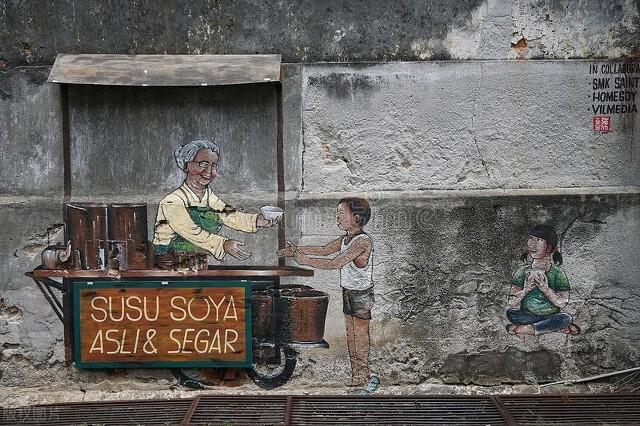
Imagine growing up like me and coming to Southeast Asia. When you grow up under the infiltration of Chinese culture and realize that learning Chinese is also a kind of wealth. All of a sudden, you are facing unfair attacks by the so-called free press on China or anyone with ties to China. Your first reaction was to jump up and protect them. Because we Malaysian Chinese have seen this situation in our kampong community, our education system or our Malaysian newspapers before.
想象一下,像我一样长大,来到东南亚,当你从小在中华文化的浸润下成长,并且意识到学习中文也是一种财富。突然间,你们又面临着所谓的自由新闻界对中国或任何与中国有联系的人的不公平攻击。你的第一反应是跳起来保护他们。因为我们马来西亚华人以前在我们的甘榜社区、我们的教育系统或我们的马来报纸上看到过这种情况。
So why am I considered pro China? This is only because I am an anti racist. At present, some people in the West think that anti China is equivalent to the so-called western values. I like to say frankly that this is just a cover for open xenophobia. Unfortunately, unlike Singaporean Chinese, we Malaysian Chinese have a deeper understanding of this point.
所以,为什么我会被认为是亲华的?这只是因为我是反种族主义者,而目前西方一部分人认为反华等同于所谓的西方价值。我喜欢直言不讳地说,这只是一个公开仇外的幌子。不幸的是,与新加坡华人不同,我们马来西亚华人在认识这一点上认识更加深刻。
Several respondents pointed out that the “discriminatory policy against Malaysian Chinese” was the reason for the “lack of loyalty” of Malaysian Chinese.
几个回答指出,“针对马来西亚华人的歧视政策”是马来西亚华人“缺乏忠诚”的原因。
Malaysia’s policy of affirmative action based on race is indeed divisive and controversial. This is a complex issue, and the political reality is rooted in history and population.
马来西亚实行的基于种族的平权行动政策确实具有分裂性和争议性。这是一个复杂的问题,政治现实植根于历史和人口。
Although there is dissatisfaction among Malaysian Chinese, the next example will refute the argument that Malaysian Chinese tend to China because of discrimination.
虽然马来西亚华人中存在不满,但下一个例子将驳斥马来西亚华人因歧视而倾向于中国的说法。
Among the Malaysian Chinese population, there is a group called the native Chinese (commonly known as Baba and Nyonya). They have lived in Malaysia for several centuries. The native Chinese have integrated into the Local Malay culture – speak fluent Malay and wear traditional Malay clothing. Although their culture has been assimilated, they are not regarded as “natives” like the Malays. Therefore, native Chinese and other Chinese “suffer” the same “discrimination”.
在马来西亚华人人口中,有一个叫土生华人的群体(通常称为Baba和Nyonya),他们在今天的马来西亚生活了几个世纪。土生华人已经融入了当地的马来文化——讲一口流利的马来语,穿着传统的马来服装。尽管他们的文化被同化,但他们并不像马来人那样被视为“土生土长的本地人”。因此,土生华人和其他华人一样“遭受”同样的“歧视”。
But despite this so-called discrimination, on the whole, the native Chinese do not care much about China or China. Among the more educated native Chinese, their world outlook is more in line with the West. In fact, they are more like typical Singaporeans. In fact, if you know that Lee Kuan Yew, the founder of Singapore, has some native Chinese descent and grew up in an English speaking family, you will instinctively understand what I mean.
但尽管存在这种所谓的歧视,总的来说,土生华人并不太关心中国或中国。在受教育程度较高的土生华人中,他们的世界观更符合西方。事实上,他们更像典型的新加坡人。事实上,如果你知道新加坡创始人李光耀有部分土生华人血统,并在一个讲英语的家庭中长大,你会本能地明白我的意思。
Now, given that both indigenous Chinese and non indigenous Chinese “suffer” the same “discrimination”, how can “discrimination” explain why the former is basically indifferent to China while the latter is attracted by China (or “pro China” in the issue)?
现在,鉴于土生华人和非土生华人都“遭受”同样的“歧视”,那么“歧视”如何解释为什么前者基本上对中国漠不关心,而后者却被中国(或问题中的“亲中国”)所吸引?
Let me look at Singapore. I have read some answers. Some of them are reasonable. Indeed, Chinese in Malaysia are discriminated against, while Chinese in Singapore are not. However, this alone cannot explain why Malaysian Chinese support China while Singaporean Chinese are indifferent to China.
再看看新加坡,我读到了一些答案,其中一些有一点道理,确实,马来西亚的华人受到歧视,新加坡的华人则没有。可单凭这一点并不能解释为什么马来西亚华人支持中国,而新加坡华人则对中国漠不关心。
The real reason is that the Chinese in Singapore are too westernized. They read, think and write in English. Don’t forget that Singapore is a British colony. Therefore, although people don’t recognize it, they respect western culture more than Chinese culture.
真正的原因是…新加坡华人太西化了。他们用英语阅读、思考和写作,不要忘记,新加坡是英国的殖民地,因此,尽管人们不承认,但他们对西方文化的敬仰会超过对中国文化的敬重。
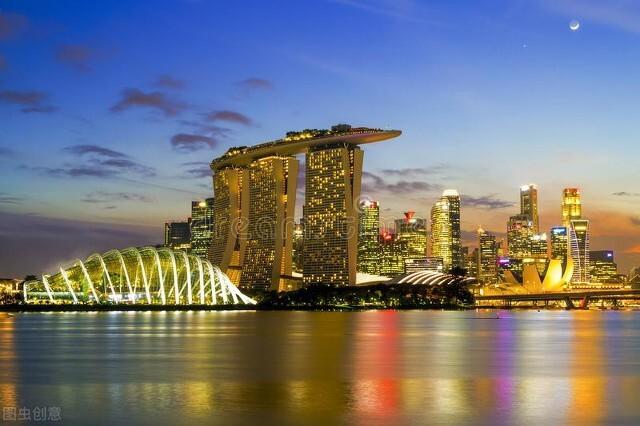
A typical Singaporean will watch English programs instead of Chinese programs. It is a self-evident fact that Singaporeans with English education will look down upon Singaporeans with traditional Chinese education. However, it is interesting that people with English education always use Singaporean nonsense, which is a terrible English derivative that people outside Singapore can not understand. Nevertheless, they think they have a better sense of superiority than Malaysians.
一个典型的新加坡人会看英语节目,而不是中文节目,一个不言而喻的事实是,受过英语教育的新加坡人会看不起受过传统华文教育的新加坡人。然而,有趣的是,受过英语教育的人总爱用新加坡语胡言乱语,这是一种可怕的英语派生语,新加坡以外的人都听不懂。尽管如此,他们认为自己比马来西亚人更有优越感。
However, some Chinese people are confused and even angry about Singapore’s international choices precisely because they are too westernized. The “real” Chinese are angry that Singaporeans are so pro american and think they have lost the essence of their own culture. Some people think that Singaporeans are like bananas. The outside is yellow and the inside is white.
然而,一些中国人对新加坡在国际上的抉择感到困惑甚至愤怒正是因为他们太西化了。“真正的”中国人对新加坡人如此亲美感到愤怒,认为他们已经失去了自己文化的精髓。有人认为新加坡人就像香蕉,外面是黄色,里面是白色的。

马来西亚华人黄再业的回答
Education and cultural identity provide a better answer, but not necessarily the only one, to explain why Malaysian Chinese are usually attracted to China.
教育和文化认同提供了一个更好的答案,但不一定是唯一的答案,说明为什么马来西亚华人通常会被中国所吸引。
This is the Chinese textbook used by Malaysian Chinese primary school students: Chinese Primary Chinese textbook – Malaysian primary school Chinese textbook
这是马来西亚华裔小学生使用的中文教科书:华小华文课本 – 马来西亚小学华文课本
The following is an excerpt from the fifth grade textbook, covering three different aspects:
以下是五年级教科书的节选,涵盖三个不同方面:
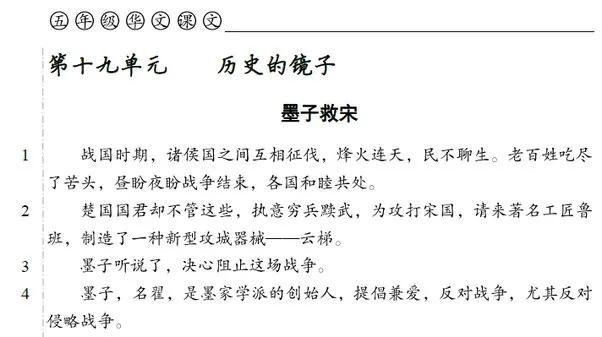
• traditional Chinese values – the following text is the historical record of the Chinese philosopher Mozi preventing war and saving the state of song, which illustrates Mozi’s philanthropic ideal (both love and non attack)
•中国传统价值观-以下文字是中国哲学家墨子阻止战争、拯救宋国的历史记录,说明了墨子的博爱理想(兼爱非攻)
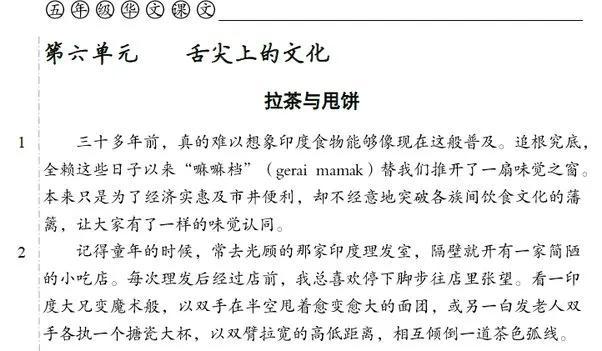
• Malaysia’s multi-ethnic culture – the following describes the origins of “teh Tarik” and “roti canai”, which are local cuisines enjoyed by all ethnic groups.
•马来西亚多种族文化-下文描述了“teh tarik”和“roti canai”的起源,这是所有种族都喜欢的当地美食。
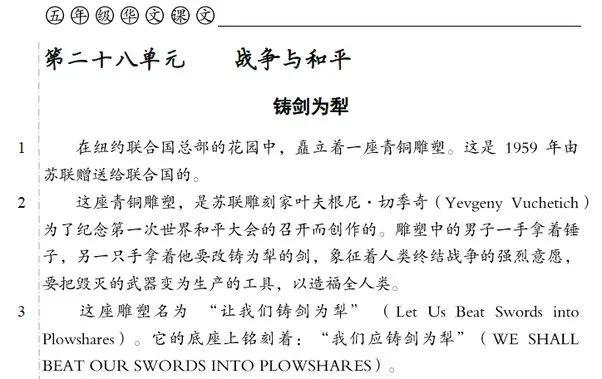
• universal values – the following text advocates world peace, inspired by a sculpture in front of the United Nations building called “casting a sword into a plow”.
•普世价值观——以下文字倡导世界和平,其灵感来自联合国大楼前一座名为“铸剑为犁”的雕塑。
• two conclusions can be drawn from the fifth grade Chinese Textbooks in Malaysia. First of all, Malaysian students who have received local Chinese education can master Chinese well (Note: the students include Malaysians and Indians), and their level of learning Chinese may be second to none outside Greater China.
•从马来西亚五年级汉语教材中可以得出两个结论。首先,接受过当地华文教育的马来西亚学生可以很好地掌握华文(注:学生包括马来族和印度族),学生学习汉语的水平可能是大中华以外地区首屈一指的。
• second, China’s traditional value system and history have a considerable impact. In fact, students studying Chinese in middle schools learn Chinese classical literature, which opens the door to the Chinese philosophy system.
•第二,中国传统价值体系和历史有相当多的影响。事实上,在中学学习汉语的学生学习中国古典文本(文言文) 文学,打开了通往中国哲学体系的大门。
• in view of this contact, Malaysian Chinese who are proficient in their own dialects naturally have easier access to Chinese News and pay more attention to China’s development.
•鉴于这种接触,精通本国方言的马来西亚华人自然更容易获得中国的新闻,并更加关注中国的发展。
• in fact, this is not different from the fact that Malaysian Muslims (almost entirely Malays) closely follow the fate of Muslim brothers in other parts of the world. A good example is that Malaysians, especially Malaysian Muslims, have always sympathized with the struggle of Palestine (the majority of Muslims). Some Malays have volunteered to serve the Palestinian cause regardless of their lives.
•事实上,这与马来西亚穆斯林(几乎完全是马来人)密切关注世界其他地区穆斯林兄弟的命运没有什么不同。一个很好的例子是,马来西亚人,特别是马来西亚穆斯林,一直同情(穆斯林占多数的)巴勒斯坦的斗争,有马来人不顾生命危险自愿为巴勒斯坦事业服务。
• however, I am happy to agree that a group of Malaysian Chinese seem to firmly support China. But they blurred the line between cultural affinity and loyalty to foreign countries.
•然而,我很乐意同意一群马来西亚华人似乎坚定支持中国。但他们模糊了文化亲和力与对外国忠诚之间的界限。
• generally speaking, Malaysian Chinese are pragmatic. They want to preserve their cultural identity and remain loyal to Malaysia. The two are not mutually exclusive. It is also in their best interest to do so.
•总的来说,马来西亚华人是务实的。他们希望保留自己的文化身份,同时忠于马来西亚。两者并不相互排斥。这样做也符合他们的最佳利益。
• in fact, multiculturalism is a way out. Deeply rooted in one’s own culture, as well as a good appreciation of other cultures and universal values, have laid the foundation for thriving in this increasingly connected world.
•事实上,多元文化主义是一条出路。在自己的文化中深深扎根,以及对其他文化和普世价值观的良好欣赏,为在这个联系日益紧密的世界中茁壮成长奠定了基础。